In the hours leading up to the Mavi Marmara massacre, Israel extended like a cloud whose shadow spread deep into the Mediterranean. The Turkish ship’s captain took evasive action but it’s hard to escape the reach of a nation whose borders are so elastic.
Anyone who reads the Israeli press will sooner or later notice one of the curious features about Israel’s geographic identity. Politicians talk about threats from the north and the south in such a way that Israel sounds like a legendary kingdom on whose periphery are regions of darkness. It doesn’t have borders as such but instead margins of indeterminate depth where it is dangerous to venture.
This might explain in part the mythopoetic imagination through which Israelis see themselves heroically standing up against the forces of evil. It also suggests why it is that a very modern state has a medieval view of the world.
Benjamin Netanyahu warned his cabinet this weekend: “Dark forces from the Middle Ages are raging against us. I have received calls from concerned officials in the Balkans and Eastern Europe who are very worried about these developments.”
The mission of the Mavi Marmara, Netanyahu seems to hint, signaled the beginning of an attempt to re-establish an Ottoman Caliphate that once again threatens to take control of the Holy Land. Nevertheless, at such a historic juncture, it’s perhaps surprising that the commander of Israel’s military forces was apparently asleep.
Was this an expression of the unshakable confidence IDF’s commander in chief has in his soldiers, or (more likely) the blasé attitude with which Israel operates in the international arena?
Israel Defense Forces chief of staff Gabi Ashkenazi was not present in the IDF’s Tel Aviv command center during the first part of the maritime takeover of the Gaza-bound Turkish ship Mavi Marmara on May 31, Haaretz learned Sunday.
Instead, the most senior officer supervising the raid was Major General Tal Russo, IDF Chief of Operations, with Ashkenazi arriving only after the takeover had taken a turn for the worse.
The absence of both Ashkenazi and his second in command, Major General Benny Ganz, will be one of the issues to be reviewed by the specialist panel named by the IDF chief to probe the raid, headed by retired major general Giora Eiland.
No wonder Israel has been dragging its feet in responding to calls for an international investigation. But now, thanks to the Obama administration, it looks like Israel may once again avoid being held accountable for its actions.
Israel last night flouted pressure for an independent international inquiry into the lethal assault two weeks ago on a flotilla of ships attempting to break the blockade on Gaza, announcing an internal investigation with two foreign observers.
The White House gave its approval for the Israeli formula, which will be confirmed by the Israeli cabinet today.
The inquiry into the raid, in which nine Turkish activists aboard the Mavi Marmara were killed, will be headed by a former Israeli supreme court judge, Yaakov Tirkel. The foreign observers are the former Northern Ireland first minister David Trimble and a Canadian judge, Ken Watkin. They will have no voting rights.
The inquiry falls short of a UN proposal for an international investigation, but was agreed after consultation with the US. The White House said last night that the Israeli inquiry meets the standard of “prompt, impartial, credible and transparent investigation”.
The US Ambassador to the UN, Susan Rice, told Fox News on Sunday:
“We think that an international component would strengthen the investigation and certainly buttress its credibility in the eyes of the international community, and we’ve had discussions with Israel as to how and whether they might go about doing that,” Rice said.
But she added it’s “obviously ultimately the Israelis’ choice” whether to participate in such a group evaluation.
“Our view is that Israel, as a democracy, as a country with a tradition of strong military justice, can conduct an investigation of this sort however it chooses to constitute it,” she said, adding, “We are not pressuring Israel to participate in anything that it chooses not to participate in.”
In effect, what the United States is saying is that unlike any other country on the planet, Israel has the right construct its own definition of the term “international.” Israel when operating outside even its own self-determined boundaries of sovereignty, when conducting an assault on a ship operating under a Turkish flag and killing Turkish citizens, nevertheless has the “right” to say, “this is our business” — and Washington agrees.
Sefi Rachlevsky describes what happens when a nation refuses to set its own limits.
Israel gave itself a nice present to celebrate the 43rd anniversary of losing its borders. The raid on the Gaza flotilla in international waters is like the first Lebanon War – as if in a nightmarish experiment, we seem to be examining the question: What happens when a country has no borders?
Israel’s maritime attack did not happen by chance. A border is one of the fundamental factors that defines a country. Decades without one have distorted Israel’s thinking.
It is self-evident that, just as a person cannot build in an area that he does not own, a country cannot build settlements outside of its borders. And yet Israel has settled hundreds of thousands of its citizens in areas that, according to its laws, are not part of the State of Israel.
It is self-evident that any couple can marry “without regard to religion, race or gender.” And yet in Israel a Jewish man and a non-Jewish woman cannot legally marry. It’s self-evident that there is no arbitrary discrimination, and yet it’s enough to use the magic words “I’m a religious woman” or “I’m an ultra-Orthodox man” and the obligation to serve in the military evaporates.
It’s self-evident that the education provided to children be based on democracy and equality. And yet in Israel, 52 percent of first-graders defined as Jews study in various religious school systems that teach students things like “You are considered a human being and the other nations of the world are not considered human beings.”
They are taught that a non-Jew is not a human being, and that anyone who kills a non-Jew is not supposed to be killed by human hands; that women are inferior, and it is an obligation that males and females be separated; and that secular people, or anyone with secular family members, cannot enter these schools.
It is self-evident that racist education cannot be funded by the government and is illegal. And yet most of the country’s first-graders receive such “compulsory education” from their government.
The results of this nightmarish experiment are self-evident. In the most recent elections, 35 percent of voters defined as Jews cast their ballots for avowedly racist parties – Yisrael Beitenu, Shas, National Union and their friends.
Critics in the Israeli media wake up only when mistakes are made. That is why – after initially cheering the declaration that “the flotilla will not pass” – they changed their tune following the imbroglio, turning into advocates of the twisted logic “be smart, not right.” But what justice is there in an attack on civilians by soldiers on the open seas?
Like the territories, international waters are not Israel; they are outside its borders. A Turkish ship on the open sea is, in effect, a floating Turkish island. An Israeli attack on such an island is not all that different from sending the Israel Defense Forces to take on demonstrators at the Luxembourg Gardens in Paris. There, too, unpleasant people who are not friends of Israel can sometimes be found.
Turkey, which is a member of NATO, was not in a state of war with Israel before the attack. Attacking its citizens on territory that is by definition Turkish is another expression of the Israeli lunacy that lacks any kind of boundaries.
An attack beyond the border must be reserved for extreme cases involving a military target that represents an entity fighting against the country and when citizens are in danger. But civilian ships, that are not carrying weapons, but are bringing civilian aid to a population that is denied chocolate, toys and notebooks, are not nuclear reactors in Iraq, Syria or Iran.
A person who grows up without external borders tends to create distorted internal borders. That is the reason for the attack on Arab MK Hanin Zuabi and her colleagues. While there were certain Arab public figures who went too far in their statements, joining a civilian aid flotilla is one of those legitimate acts which are supposed to be self-evident.
And yet, what was self-evident became betrayal. And citizenship, one of the unconditional foundations of existence, has turned into something that can be revoked – in this case on the basis of ethnicity, a tactic used in fascist regimes. The street has returned to the atmosphere that prevailed under “responsible” opposition leader Benjamin Netanyahu and led to the assassination of prime minister Yitzhak Rabin – and the next murder is in the air.
The Israeli deed at sea is liable to reach The Hague. The problem is that Israel has genuine enemies who want to destroy it. A country that does not do everything in its power to accumulate legitimacy, along with turning Iran into an entity that is losing legitimacy and can therefore become a target of activities to undermine it, is a country losing its basic survival instinct. Without borders, it turns out, you lose even that.
Young Israelis who have grown up without borders are now dancing and singing “In blood and fire we will expel Turkey” and “Mohammed is dead.” If this keeps up, Israel will not make it to The Hague. The entity gradually replacing the State of Israel is liable not to exist long enough to get there.





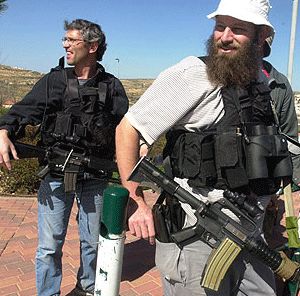 But are settlers really “civilians” as intended by the protective language of the Fourth Geneva Convention? This is debatable on at least one score, as the language dealing with “protected persons” is often prefaced with “civilian persons who take no part in hostilities…”
But are settlers really “civilians” as intended by the protective language of the Fourth Geneva Convention? This is debatable on at least one score, as the language dealing with “protected persons” is often prefaced with “civilian persons who take no part in hostilities…”
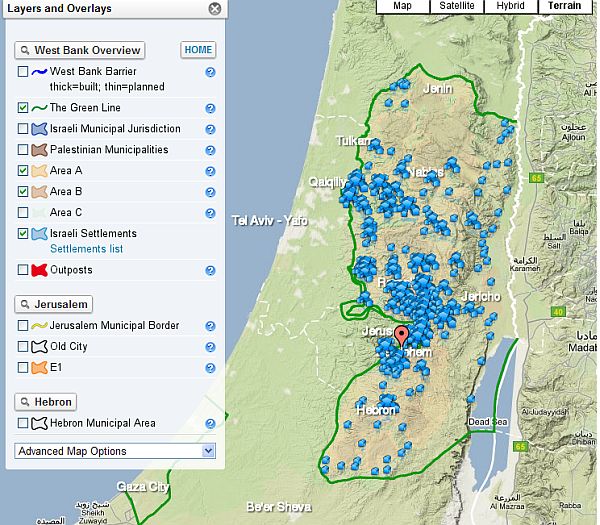
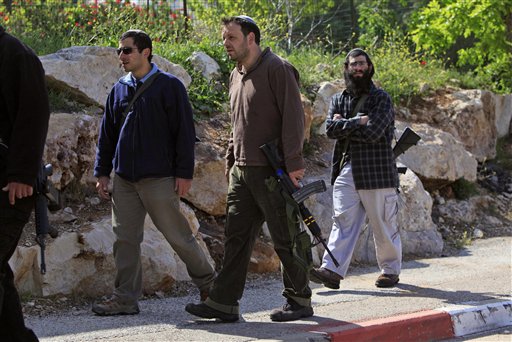

 The most pressing problem with the settlements is not that they are obstacles to a final peace accord, which is how settlement critics have often framed the issue. The danger is that they will doom Zionism itself.
The most pressing problem with the settlements is not that they are obstacles to a final peace accord, which is how settlement critics have often framed the issue. The danger is that they will doom Zionism itself. On the other side of the debate are Israelis such as Naftali Bennett, Benjamin Netanyahu’s former chief of staff and the recently named director-general of the settler advocacy group the Yesha Council.
On the other side of the debate are Israelis such as Naftali Bennett, Benjamin Netanyahu’s former chief of staff and the recently named director-general of the settler advocacy group the Yesha Council.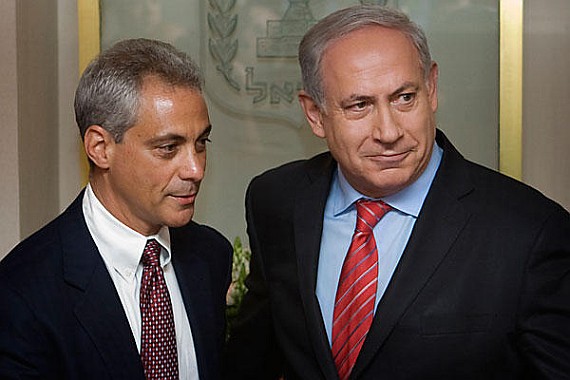
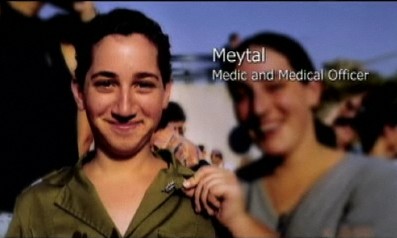
 The photograph is not shown in the documentary, but in the mind’s eye of most Americans it probably evokes memories of Abu Ghraib.
The photograph is not shown in the documentary, but in the mind’s eye of most Americans it probably evokes memories of Abu Ghraib.